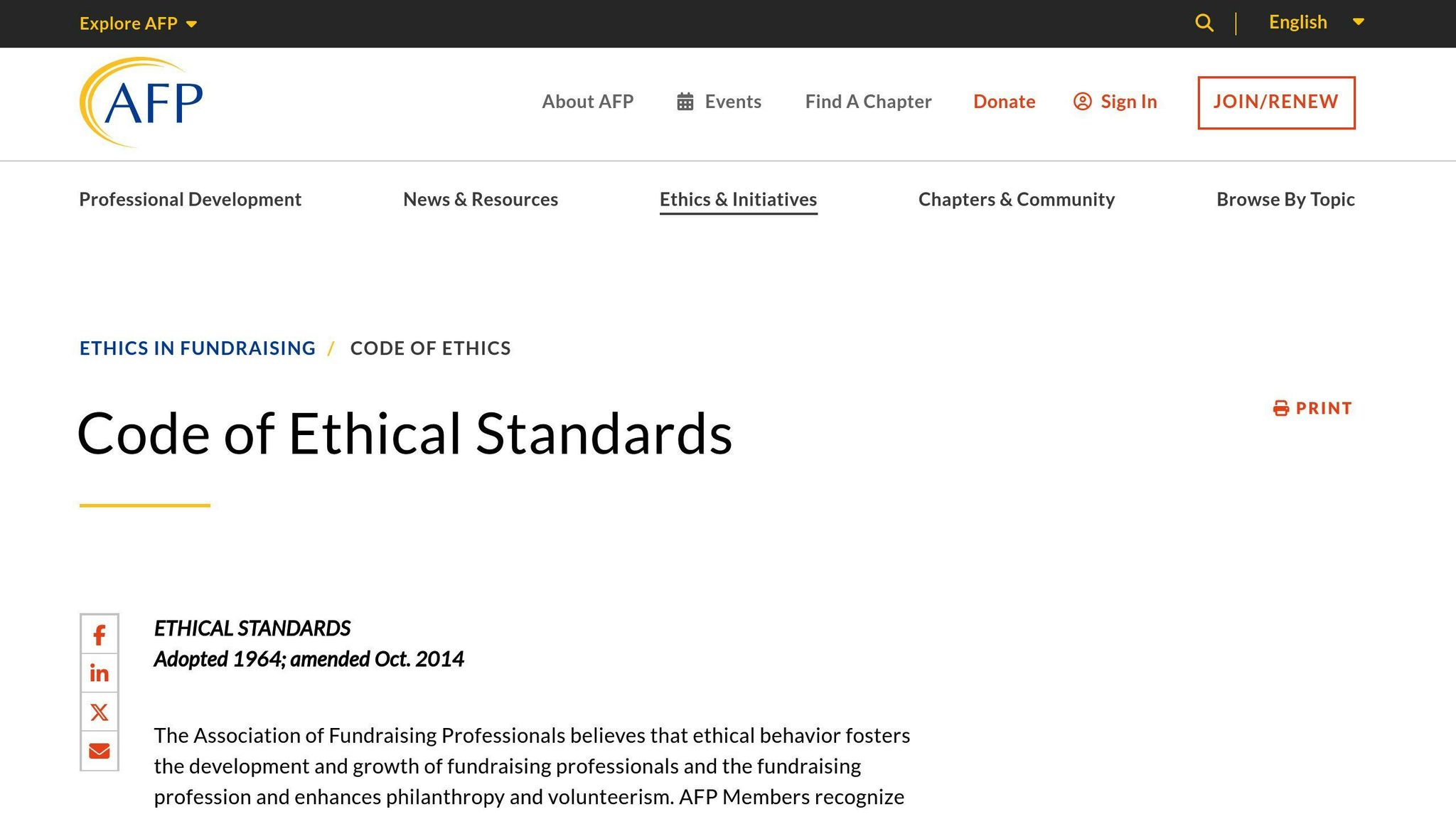Fundraising Ethics: Principles, Standards & Best Practices
Learn about ethical fundraising principles, standards, and best practices to build trust, protect reputation, and achieve mission for nonprofits.

Ethical fundraising is crucial for nonprofits to build trust, protect their reputation, and achieve their mission. Here's a quick overview of key ethical principles and practices:
| Principle | Description |
|---|---|
| Transparency | Be open about how funds are used |
| Accountability | Take responsibility for actions and decisions |
| Donor rights | Respect and protect donor information |
| Financial responsibility | Manage money properly |
| Honesty | Be truthful in all communications |
Key ethical standards include: • AFP Code of Ethics • Donor Bill of Rights • Financial accountability measures
Best practices:
- Clearly explain mission and results
- Manage donations responsibly
- Keep accurate records
- Use fundraising tools ethically
- Address conflicts of interest
To maintain ethical standards:
- Create a written ethics policy
- Train staff on ethical practices
- Implement checks and balances
- Regularly update guidelines
By following these principles and practices, nonprofits can ensure their fundraising efforts are ethical, effective, and sustainable.
Related video from YouTube
Key principles of ethical fundraising
Being open and responsible
Nonprofits must be clear about their goals and how they use donations. They should:
- Give regular updates to donors
- Show how money is being spent
- Build trust with supporters
This openness helps organizations keep donors for a long time.
Putting donors first
Treating donors well is key. This means:
- Saying thank you quickly
- Keeping donor information private
- Letting donors stay anonymous if they want
- Telling donors how their money helps
When organizations focus on what donors need, people are more likely to keep giving.
Being honest
Telling the truth is very important. Organizations should:
- Not overstate what donations can do
- Make sure all their materials are truthful
- Avoid tricks to get donations
- Be real in all talks with donors
Being honest helps keep public trust in fundraising.
Using donations as intended
Organizations must use donations the way they said they would. This includes:
| What to do | Why it's important |
|---|---|
| Tell donors how their money will be used | Keeps donors informed |
| Spend money carefully | Shows respect for donations |
| Report on results | Lets donors see their impact |
| Follow all laws | Keeps the organization safe |
Using donations correctly helps organizations keep their promises to donors.
Protecting donor information
Keeping donor information safe is crucial. Organizations must:
- Keep donor data private
- Use donor information only as allowed
- Never share donor details without asking
- Have strong ways to protect data
When organizations respect donor privacy, it shows they care about doing things right.
Ethical standards in fundraising
AFP Code of Ethics

The Association of Fundraising Professionals (AFP) has a set of rules for fundraisers. These rules help keep fundraising honest and trustworthy. The main points are:
- Don't do things that hurt organizations, clients, or the job
- Tell people if you have conflicts of interest
- Follow all laws
- Be honest about your skills and what you've done
- Keep private information secret
Following these rules helps people trust fundraising.
Donor rights
Donors have rights that fundraisers must respect:
| Right | What it means |
|---|---|
| Tax receipts | Get official receipts for taxes |
| Information | See charity reports and money details |
| Privacy | Keep donor info private |
| List removal | Ask to be taken off shared lists |
| Complaints | Get quick answers to problems |
These rights make sure fundraising is open and fair.
Financial accountability
Fundraisers must be careful with money. They should:
- Use the charity's real name when asking for money
- Show money details when asked
- Keep correct donor records
- Let donors choose how often they're contacted
- Handle complaints well, including letting people talk to the board
These rules help keep fundraising honest and open.
Best practices for ethical fundraising
Explaining your mission and results
Being open about your work is key in ethical fundraising. Tell donors clearly what your group does, what it wants to do, and what it has done. Show how you use money and what good comes from it. Give updates often to build trust.
| Best Practices | What to Do |
|---|---|
| Clear mission | Short, easy-to-understand statement of purpose |
| Show results | Regular updates on what programs achieve |
| Open about money | Show how funds are spent |
| Easy-to-find info | Put details on website and in messages |
Managing donations well
Taking good care of donations is a must for ethical fundraising. Set up good ways to track and use funds as promised. Follow what donors want for their gifts. Be ready to show how you used the money.
- Write down all donor wishes
- Check often how special funds are used
- Talk to donors if there are problems using funds
- Check if fundraising is cost-effective
- Pay fundraising staff fairly
Keeping accurate records
Keep good records of all fundraising work, gifts, and spending. This helps you be open, follow laws, and talk clearly with donors and others who care about your work.
1. Use a good system to manage donor info
- Track all talks with donors and what they like
- Keep contact info up to date
- Record gift history and any rules for gifts
2. Set up clear money reporting steps
- Check your own books often
- Track all spending in detail
- Show clearly which funds go to which programs
3. Keep data private and safe
- Use strong ways to protect data
- Teach staff about privacy rules
- Check and update safety measures often
Using fundraising tools ethically
When using different ways to raise funds, think about what's right. Don't use tricks, keep donor info private, and always be honest.
| Fundraising Way | What to Think About |
|---|---|
| Follow donor wishes, let them opt out | |
| Online | Keep payments safe, have clear privacy rules |
| Events | Show costs clearly, set fair ticket prices |
| Working with companies | Match your values, tell people about the deal |
Dealing with conflicts of interest
Find and fix possible conflicts of interest quickly. Make clear rules for telling about and handling conflicts. This helps keep your group honest and trusted.
- Write down rules for conflicts of interest
- Ask board members and key staff to tell about conflicts often
- Make steps for dealing with conflicts
- Teach how to spot and report possible conflicts
- Be open about choices affected by conflicts
Creating ethical fundraising policies
Writing an ethics policy
A good ethics policy for fundraising should cover:
- Basic rules for being open and honest
- Following laws about fundraising
- How to treat donors well
- Ways to handle money properly
- What to do if someone has a conflict of interest
| Policy Part | What It Covers |
|---|---|
| Basic Rules | Being open and honest |
| Laws | Following fundraising rules |
| Donor Care | Giving clear info, keeping data safe |
| Money Handling | Clear budgets and reports |
| Conflicts | How to spot and deal with conflicts |
Teaching staff about ethics
It's important to teach your team about good fundraising practices. Everyone who asks for money should know the rules.
Ways to teach:
- Have regular meetings about ethics
- Give clear examples of good practices
- Practice what to do in tricky situations
- Talk openly about hard choices
- Help staff when they have questions
Setting up checks and balances
Having ways to check your work helps make sure you follow your ethics policy. This means creating steps to look over your work and fix problems.
Main parts:
- Check your own work often
- Have outside experts look at your work
- Make it easy for people to report problems
- Listen to what donors say and think
- Look over your fundraising materials regularly
Updating ethics guidelines
Your ethics rules should change as things change. Look at them often to make sure they still work well.
How to update:
- Check your rules every year
- Ask staff and donors what they think
- Learn about new fundraising rules
- Use what you've learned from past problems
- Tell everyone about any changes you make
Ethics in different fundraising methods
Mail and phone fundraising
When raising money by mail or phone, it's important to be honest and respect donors. Here are some key points:
| What to do | Why it matters |
|---|---|
| Be clear about costs | Shows donors how their money is used |
| Respect donor privacy | Builds trust and follows rules |
| Don't push too hard | Keeps donors happy and willing to give |
Online and social media fundraising
Raising money online needs special care to keep information safe and be honest. Here's what to focus on:
- Keep donor information safe with good computer security
- Tell donors how you'll use their online gifts
- Don't trick people on social media
Large donations and planned giving
For big gifts, it's extra important to be careful and honest. Here's what to do:
- Tell donors if there might be conflicts of interest
- Make sure donors understand what they're doing
- Explain in detail how you'll use the gift and what it will do
Fundraising events
When planning events to raise money, keep these things in mind:
| What to think about | How to do it right |
|---|---|
| Event costs | Tell donors exactly what you spent |
| Matching your values | Make sure the event fits with what you believe in |
| Treating donors well | Focus on making donors happy, not just making money |
Working with companies
When teaming up with companies to raise money, nonprofits need to be careful. Here's how:
- Be clear about why you're working together
- Make sure the company believes in the same things you do
- Tell everyone how you'll use the money from the company
Solving ethical problems in fundraising
Meeting both charity and donor needs
To balance the needs of charities and donors:
- Be open about how you use money
- Tell donors how their gifts help
- Give updates on what you've done
- Let donors choose how they want to give
This helps build trust and keeps donors happy while helping the charity.
Handling restricted donations
Restricted donations can be tricky. Here's how to handle them:
| What to do | Why it's important |
|---|---|
| Explain limits clearly | Stops mix-ups |
| Write down what donors want | Makes sure money goes to the right place |
| Check restricted funds often | Finds money that's not being used |
| Talk to donors if there's a problem | Keeps donors' trust |
If rules for a gift cause problems, talk to the donor about changing them to help the charity's work.
Ethics during emergencies
Emergencies can make it hard to follow rules. To stay honest:
- Make plans for emergency fundraising before you need them
- Be clear about what you need without making people feel bad
- Make sure all emergency asks fit with what your charity does
- Keep good records of emergency money and how you use it
This helps keep donors happy and trusting, even when things are tough.
Fundraising in different places
Raising money in different places needs care. Here's what to think about:
- Learn about how people give in different places
- Change how you ask to fit different groups
- Be careful about things that might upset people when talking about money
- Make sure your messages make sense in other languages
Checking ethical performance
Measuring ethical fundraising
To check if fundraising is done the right way, nonprofits should:
- Track how much money is spent on fundraising
- Look at money records often
- See if fundraising meets good standards
- Ask donors what they think
Make a plan to check both numbers and what people say about the fundraising.
Reporting results clearly
Telling people about fundraising results builds trust. Here's how to do it well:
| What to do | Why it helps |
|---|---|
| Use the same money rules as others | Makes it easy to compare |
| Show details of money in and out | Proves you're open about money |
| Make reports easy to read | Helps people understand |
| Share reports often | Keeps everyone in the loop |
Doing these things helps donors trust the nonprofit.
Getting outside reviews
Having others look at your work helps show you're doing things right. Try these:
- Ask money experts to check your records
- Get approved by groups that rate nonprofits
- See how you're doing compared to other nonprofits
- Ask donors and people you help what they think
Getting outside opinions shows you want to do better and be open about your work.
Future of fundraising ethics
New issues in online fundraising
As online tools grow, fundraisers face new problems in digital giving. Social media, smart computer programs, and group funding are now big parts of getting large gifts. Fundraisers must use these tools while still being honest and keeping donors' trust. They need to think about:
- Being clear about online campaigns
- Keeping donor information safe in online payments
- Stopping false information on social media
- Being personal without bothering donors too much
Using smart computers and data carefully
Smart computers and big data help fundraising a lot, but they can cause problems. Fundraisers need to think about:
| What to think about | What to do |
|---|---|
| Keeping data private | Use strong safety measures and ask donors clearly |
| Making sure computers are fair | Check computer systems often to make sure they treat everyone the same |
| Being open | Tell donors when you use smart computers |
| Having people check | Make sure people are still involved in important fundraising choices |
It's important to use new tools while still doing things the right way.
What donors want now
As younger people give more money, what donors want is changing. Young donors often:
1. Want to know more about how their money helps
2. Like to give money online
3. Want fundraising that feels more personal
4. Care a lot about doing good and being honest
Fundraisers need to change how they work to make these donors happy while still doing things right. This might mean:
- Finding better ways to show how donations help
- Telling stories about their work online
- Making sure personal fundraising is still honest
- Making sure what the group believes matches what donors care about
Conclusion
Main points to remember
Good fundraising follows these key rules:
| Rule | What it means |
|---|---|
| Be open | Show how you use money |
| Tell the truth | Be honest about what donations do |
| Respect donors | Keep their info private and follow their wishes |
| Follow laws | Do everything by the book |
| Avoid conflicts | Don't let personal interests affect your work |
These rules help build trust and make the organization look good.
Why ethics always matter
Doing things right in fundraising is always important. Here's why:
| Reason | How it helps |
|---|---|
| Builds trust | People believe in your work |
| Helps long-term | Keeps donors giving over time |
| Matches your goals | Shows you mean what you say |
| Stops problems | Keeps your name clean |
| Helps those in need | Makes sure help gets to the right people |
Good ethics mean:
- Donors trust you more
- You can raise money for a long time
- Your actions match what you believe in
- You avoid big problems that hurt your name
- The people you help get the most from donations
FAQs
What are the principles of ethical fundraising?
The main rules for good fundraising are:
| Rule | What it means |
|---|---|
| Tell the truth | Always be honest, don't trick people |
| Respect others | Follow what donors want, be kind to those you help |
| Be open | Show how you use money and what it does |
| Take responsibility | Use money well and tell donors what you're doing |
| Do the right thing | Avoid problems and follow good rules |
These rules help groups:
- Make people trust them
- Look good to others
- Keep donors for a long time
- Work well and do good things

